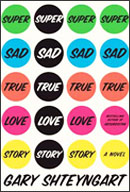Rootless Cosmopolitan(s)

The search for the Next Big Thing is as endemic in the American literary world as in politics and the clothing industry. When it comes to writers, the itch tends to express itself through the excited serial discovery of identifiably new or neglected "voices," preferably young and often of the ethnic or sexual variety: African-American, or second-wave feminist, or, recently, immigrant Russian-Jewish. Members of this last category are taken to include the short-story writer Lara Vapnyar, the music critic Alex Halberstadt, the literary anthologist Boris Fishman, and Keith Gessen, a founder of the cultural journal n+1 and sometime novelist. Whether or not there is a coherent Russian-Jewish "school" in contemporary American letters is debatable; but there is no question that its star is Gary Shteyngart.
Born in Leningrad in 1972, raised in Manhattan from 1979, Shteyngart came to literary prominence in 2002 with The Russian Debutante's Handbook: a preternaturally skillful, clear-eyed, large-hearted comic novel about the misadventures of a young second-generation Russian-Jewish American. The book was a critical and commercial success, and deservedly so. Absurdistan, which followed in 2006, did not ascend to the same heights of either sales or acclaim—or merit—but still could not be described as a failure. Now a third novel, Super Sad True Love Story has appeared to thunderous praise ("Shteyngart's best yet," Publishers Weekly) and voluminous sales.
An end-of-the-world romance, Super Sad presents a dystopian picture of global society slipping ever more quickly into simultaneous want and opulence. The book opens in a decadent Italy, where we witness the fumblings of Lenny Abramov, an unsuccessful purveyor of life-extension techniques, and the book's main narrator, as he attempts to meet the sales expectations of his superiors and to seduce Eunice Park, a young Korean-American woman spending a year abroad after finishing her college education with a major in Images and a minor in Assertiveness.
The scene soon switches to New York and to a crumbling, militaristic America whose dissolution echoes the condition of Lenny's own life. On his return to his adopted nation, Lenny finds himself encumbered by debt, bad health, and a burning yearning for Eunice who, having followed him home, toys serially with his affections before leaving him for his boss and thereby prompting his flight back to Italy. Other super-sad events in and around Lenny's life include a series of riots in New York and a massive infrastructural collapse that cripples digital communications nationwide.
Shteyngart clearly intends Super Sad as satire, and presumably we are meant to take all this apocalypse with a light heart. If the book qualifies as satire, however, it is only in the most antique sense of the term. From the Latin, satura: a farrago of invective and exaggeration. The book's plot is almost mindlessly hyperactive, its psychological situations both tedious and extreme, its setting farcical, its social observations a stew of slurs lazier and more hackneyed than a superannuated Catskills comedian's. In Super Sad, young Jewish-American men are whiny, physically weak, and easily cuckolded; older Jewish-American men are untrustworthy and avaricious; young Korean-American women are fashion-obsessed, ambitious, fickle, materialistic, and cold-hearted; their mothers speak pidgin English.
It is hard not to see in all this a steep falling-off from Shteyngart's early achievement—or, in the critical response to it, a rush to cover early bets. The Russian Debutante's Handbook appeared eight years ago: a wildly original, antic novel of sex, drugs, money, politics, literary life, terrorism, and, most mysterious of all, Americanization. Since then, cheered on by sales and increasingly forced-sounding reviews, Shteyngart has been burgeoning steadily into mediocrity.
Nor, at this point, can one report better of his nominal cohort. If it was once hoped, with reason, that these lavishly gifted writers would take up where the great American Jewish novelists and critics of the 1940's, 50's, and 60's left off, none has yet capitalized fully on his or her talent.
Shteyngart promised more, which makes his artistic peripety all the more regrettable. As for the still-youngish Russian-Jewish-American writers as a group, it remains to be seen whether another star will yet be born to what is rapidly becoming a Last Big Thing.
Sam Munson is a writer and critic in New York. His novel, The November Criminals, was published recently by Doubleday.
Comments are closed for this article.




